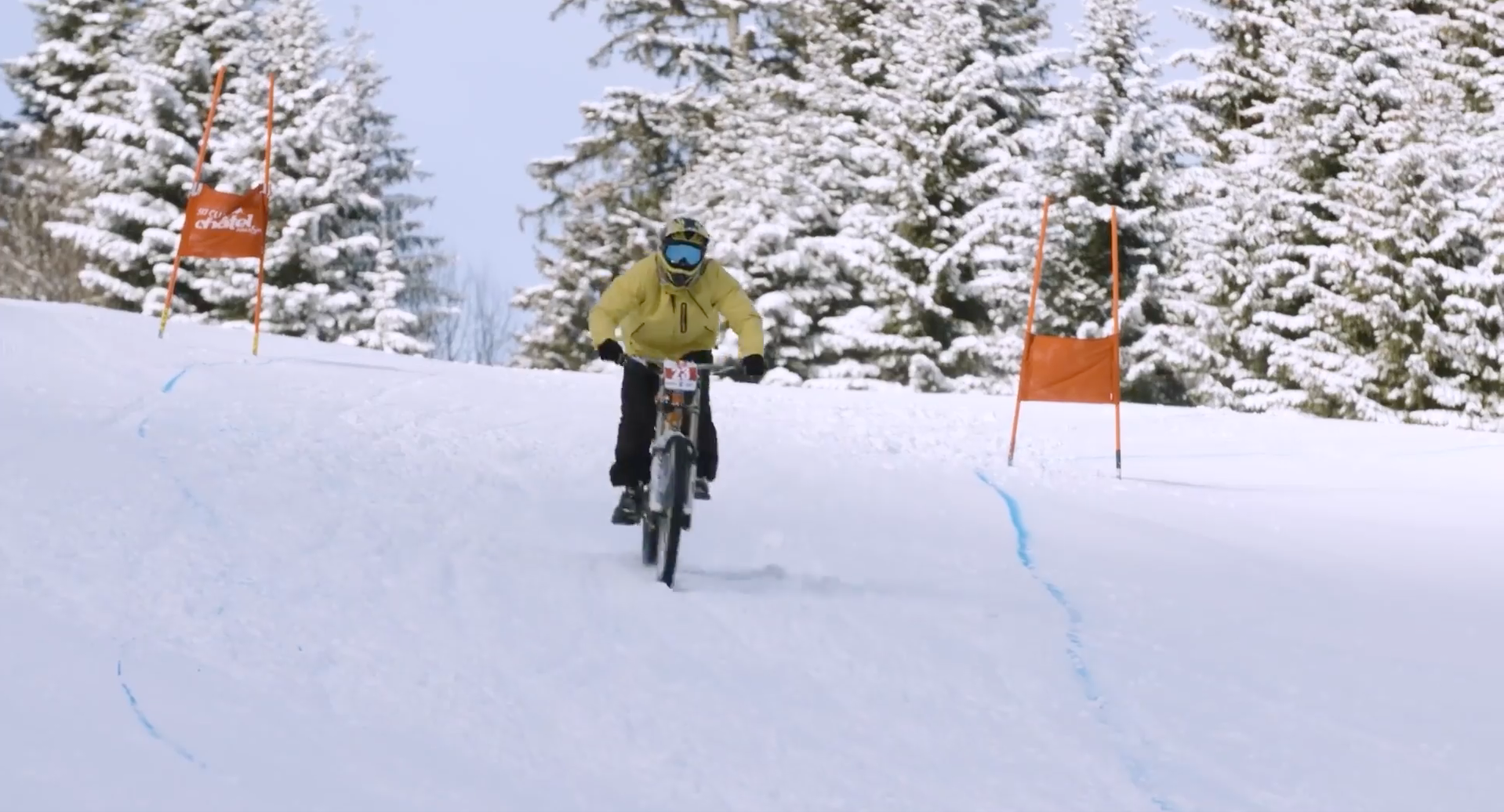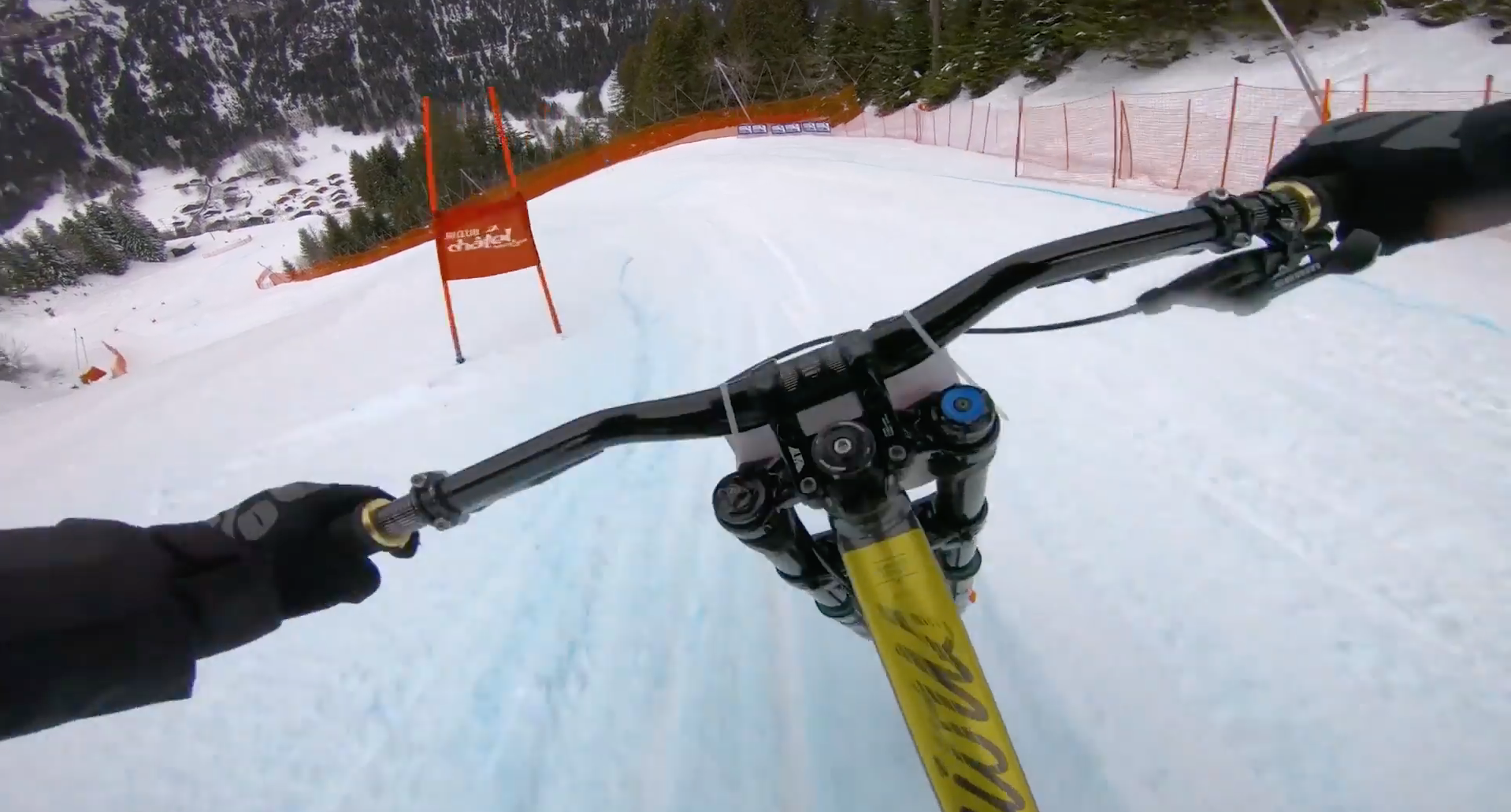The UCI has announced the first Snow Bike World Championships, which will be held on February 10-11 in the Haute-Savoie village of Châtel, France.
Snow bike is a discipline that was first introduced by the UCI in 2019, taking inspiration from both downhill mountain biking and alpine skiing. In the inaugural Snow Bike Worlds, there will be two competition formats:
Super-G – a single run down a slope with a vertical drop of 350-650 metres (depending on the course), with gates every 20-25 metres.
Dual slalom – a series of short (~30-second) elimination races in which two riders compete on parallel slalom courses, much like the similar format in snowboard and alpine skiing. There are two heats for each pairing, with riders switching courses, and the fastest combined time advancing to the next round.
In both formats, riders compete on downhill mountain bikes – usually with wider or studded tyres for grip.
Although the existence of a Snow Bike World Championships is new, the discipline is not – in varying forms. Snow bike, or something like it, has been around since at least the 1990s, with downhill mountain biking on snow featured at the 1998 Winter X-Games. Until 2020, there was also a motorised thing called 'Snow Bike' at the Winter X Games. And all of those are distinct from commercial ski-adjacent products of the same name, which are used in a separate discipline that gets occasional coverage from the likes of Pinkbike.
As for the UCI take on snow bike: the organisation began trialling events in 2019, with the French Cycling Federation hosting three events in early 2019. A five-round, multi-continent snow bike series was also planned for 2020, before it was thwarted by the COVID-19 pandemic. In late 2021, the proposal was back on the table at UCI management committee meetings, although the re-emergence of snow bike plans was somewhat lost in the more impactful news of the organisation’s entry into gravel cycling.
With confirmation of the 2024 Snow Bike Worlds, there is at last some clarity on the discipline’s future – but, as is often the case, there is likely more going on behind the scenes.

Cycling as a winter sport
Throughout David Lappartient’s presidency, the UCI has been very close with the International Olympic Committee (IOC). Lappartient was elected as a member of the IOC in February 2022, a position he holds in tandem with chairmanship of the IOC’s e-sports and gaming liaison group.
His ties with the IOC are set to become even closer – he is favoured to become president of the French National Olympic and Sports Committee (CNOSF) following the shock resignation of current head, Brigitte Henriques, a year out from the Paris Olympics. That additional full-time role would see him split his time between UCI headquarters in Switzerland (2.5 days a week) and CNOSF headquarters in Paris. Lappartient explained away that apparent conflict by touting his work ethic and ability to work 85 hours a week.
Lappartient – who in addition to being president of the UCI and an IOC member, also executes at least three further private and political roles in Morbihan, France – has spoken of his desire to “be of service to the Olympic family”. But there is ambition for cycling to take a more prominent role in the Olympic movement, and the devil’s in the detail of the UCI’s past words and actions on that front.
Snow bike’s winter sports credentials – and even the discipline’s name, which overlaps with multiple existing winter sports – perhaps signals a future push for the cycling event to appear at the Winter Olympics. This isn’t the first time the UCI has pushed for consideration of a cycling discipline at that event. In 2021, a round of the Cyclocross World Cup was first held on snow in Val di Sole, Italy, with organisers at the time touting it as a stepping stone for CX to become a Winter Olympic sport.

In fact, discussions around CX joining the Winter Olympics had been in play since 2014, under Brian Cookson’s presidency, with Cookson himself noting in 2021 that the IOC stance at the time was to push back, reserving Winter Olympics for sports “in which snow or ice was a necessary element.” That’s not the case with cyclocross, but would be the case for snow bike.
If snow bike was to move into that space it would likely be met with opposition from traditional winter sports, who have repeatedly blocked the inclusion of interlopers. In 2017, the International Ski Federation pushed back on World Athletics’ proposal of cross-country running in the Winter Olympics, saying that there needed to be “DNA on/with snow and ice”. The International Volleyball Federation has also made moves into the Winter Olympics space, with a beach volleyball-like ‘snow volleyball’ World Tour launched in 2019, and appearing as a demonstration event at the 2018 Pyeongchang Games.
It’s early days for snow bike, but Lappartient’s growing influence in the Olympic movement could help ease some growing pains. If the UCI gets its way, its future could be as a Winter Olympic sport.
Did we do a good job with this story?



